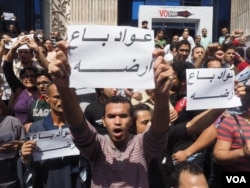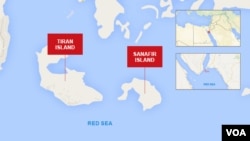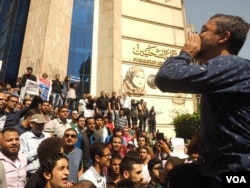Tensions flared in Egypt on Friday as protests over the handover of two islands to Saudi Arabia were dispersed or prevented by security forces with tear gas and military blockades.
Outside the Journalist Syndicate, one of the few places where protesting is still legal in Cairo, police held their ground for most of the day while hundreds of people chanted anti-government slogans.
Protesting the handover of the islands Tiran and Sanafir, activists shouted, "The people demand the end of the regime" and "Awad sold his land!"
The latter chant is an Egyptian proverb expressing shamefulness in giving up land. For many locals, it is considered an undignified denial of identity.
The Egyptian government says Saudi Arabia has legal and historical sovereignty over the islands, and it is simply returning the kingdom's own land.
"We didn't relinquish even a grain of sand," said Egyptian President Abdel-Fattah el-Sissi on Wednesday.
Protesters said that neither the public nor the newly-elected parliament was consulted about the arrangement in advance. Tiran and Sanafir are not only strategically located, they are also part of an Egyptian national park in the Red Sea, famous for world-class scuba diving and snorkeling.
For roughly the past two-and-a-half years, the streets of Cairo have been relatively quiet and opposition voices have mostly been heard indoors.
"The islands are the straw that broke the camel's back," said Mohammad Tarek, a 27-year-old university student at the protest. "We have many problems that have caused us to come out."
Saudi-Egypt bridge
The transfer of the islands clears the way for Saudi Arabia to build a bridge linking Egypt and the kingdom by land, according to analysts.
On a recent state visit to Cairo intended to boost relations between the two Arab nations as Iran grows in geopolitical strength, Saudi King Salman bin Abdul-Aziz Al Saud pledged $24 billion in loans and investments to Egypt.
Saudi bids to build the bridge, which would be nearly 15 kilometers long, were part of the deal.
"This is going to be a huge economic boost in the region," wrote Hussein Shobokshi, a commentator for the Saudi Gazette. "It will not only benefit the two countries, but will also help in improving economic ties between the African and Asian continents."
Some officials insist that the transfer of power over the islands is not a prize given to the Saudis in exchange for aid, but a legal obligation.
Saudi Arabia passed its authority over the islands to Cairo in 1950, saying Egypt was better equipped militarily to secure the Straits of Tiran. In 1967, Israel grabbed them after war broke out when Egypt announced plans to ban Israeli ships from passing through the straits.
After the 1979 peace deal between Egypt and Israel, the islands were returned to Egyptian control, along with other lands.
The recent announcement that they will be returned to Saudi Arabia immediately provoked criticism from Egyptian commentators.
Officials said the critique was unfair and could damage relations between Saudi Arabia and Egypt.
"I think that all of these poisonous media outlets should stay silent until all the documents related to this deal come to parliament for discussion," said Alaa Abed, a member of parliament, according to local media.
Volatility at protests
Protesters were warned Thursday not to attend rallies the Interior Ministry said were being staged by terrorists, and promised "all necessary and decisive legal measures to preserve security and stability."
Demonstrators were arrested in both Cairo and Egypt's second city, Alexandria.
Outside the Journalist Syndicate, government supporters and protesters sporadically clashed, mostly shouting and shoving while surrounded by heavily armed police carrying tear gas.
Egypt's newly elected parliament has not yet completed its review of the island handover, but it is expected to approve the deal.
After a meeting Wednesday, parliament members said the transfer of power does not require a public referendum under Egyptian law as some activists suggest, but does require parliamentary approval.
"If these two islands are really part of Saudi Arabia," Abed said, "We will say yes, and if not, we will say no."
Hamada Elrasam contributed to this report from Cairo.





